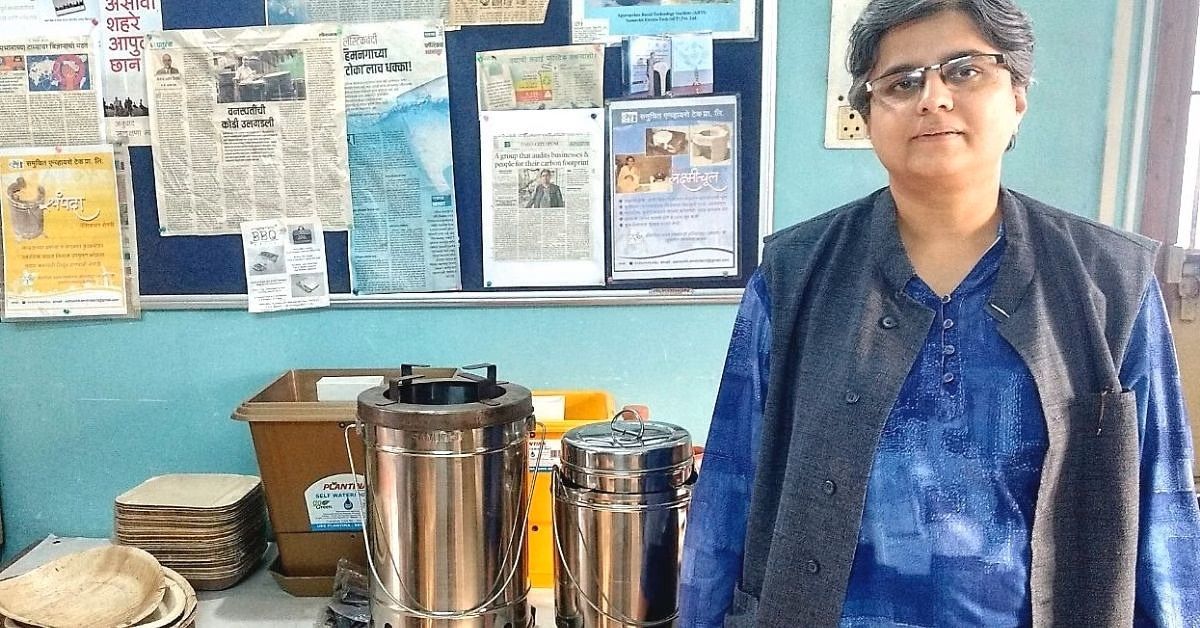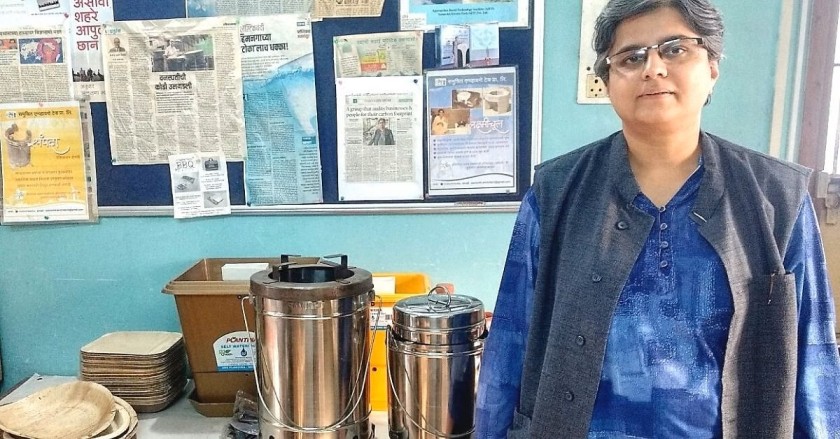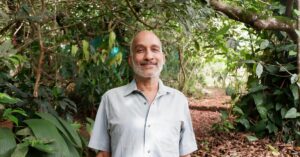Award-Winning Scientist Fights Air Pollution by Turning Agri-Waste into Biochar Fuel
Award-winning scientist Dr Priyadarshini Karve researched eco-friendly ways of agro-waste management for over 20 years, inventing unique products to offer clean-fuel alternatives to firewood for India’s urban residents.

Having lived in the small town of Phaltan, about 100 km from Pune, Dr Priyadarshini Karve grew up witnessing lush fields of sugarcane on her way to school and back. But along with this view, she also witnessed smoke-filled post-harvest waste management of the sugarcane crop, which often included burning dry leaves and other organic material.
The dense smoke spread through the area, polluting the air and making it difficult for the residents in her village to breathe. This made her ponder about cleaner solutions to treating agricultural waste, which eventually led her to pursue an education that would provide greener solutions.
Now an award-winning environmentalist, Dr Karve began studying methods to convert agricultural waste to coal in 1997. After getting a special Central Government grant ‘Young Scientist Scheme’, she was able to discover technology that converted agro-waste to biochar briquettes.
Biochar is another name for charcoal produced by plant material. When stored underground for long periods, it can emerge as a natural solution to combat climate mitigation and abide by sustainability goals.
Her method involves biomass gasification with a controlled air supply that leads to the volatile gas burning off. This process leaves behind ‘biochar’ — almost pure carbon. Incidentally, her research also led to the development of a unique stove that could cook rice-based meals with just 100 grams of biochar briquettes.
After several improvements, her revolutionary design — now called the Samuchit Transflasher Kiln, has aced garden waste management in urban homes. Another product — the smokeless Samuchit Steam Cooker Stove, has also proven to be more effective than traditional firewood stoves.
In a career of environmental conservation spanning 20 years, Dr Karve’s inventions have reduced urban dependence on firewood, often known as the ‘kitchen killer’ for its toxic impact on women’s health.
“In rural India, the waste biomass is widely used as a fuel in traditional stoves but is highly inefficient. The idea was to develop a high-performance fuel and a stove designed specifically for its efficient use,” Dr Priyadarshini Karve tells The Better India.
During the late 1990s, she worked at the Appropriate Rural Technology Institute and managed to convert sugarcane crop waste to biochar, which was then compressed to produce biochar briquettes. However, sugarcane farmers did not opt for her slightly labour-intensive solution. The process required the deployment of several workers that would convert waste into coal briquettes.
“Also, since 1965, the urban population switched from charcoal to LPG cylinders for cooking. As the rural population aspired to an urban lifestyle, shifting from biomass to biochar briquettes was not aspirational,” she adds.
So, continuing with her journey towards finding greener solutions for agro-waste disposal, she joined an academic study at the UK Biochar Research Centre at the Scotland’s University of Edinburgh in 2004, which hoped to understand the use of biochar in Cambodia, India, and the Philippines. The project, she says, allowed her to interact with a number of researchers to improve biochar technology and discover its true capabilities.
With an enhanced interest in climate change mitigation, two years later, she began marketing her biochar kiln as a garden waste management unit through Samuchit Enviro Tech, a company she now heads.
Tired of waste from leaves in their gardens, urban residents often resorted to composting it. Her kiln offered an easier, time-saving solution. The kiln, which was altered for managing garden waste, has double walls with strategically located holes. “The first layer of dry organic waste is lit and covered by a lid. The air from the holes enters the chamber, initiating the natural draught gasification process. The heat from the first layer percolates to the other layer, drives out the volatile gases, and converts the waste into biochar,” she says.
Additionally, its foldable design permitted users to dismantle and store it in dry places during monsoon. Her design, now more attractive and compact, is now oriented towards the needs of an urban resident. Over the last few years, she has managed to sell nearly 10,000 pieces, priced at Rs 7,000.

Dr Priyadarshini Karve.
The biochar briquettes make gardens more fertile and serve as smokeless fuel. Their ability to lock 30 per cent of the carbon in garden waste also fights climate change by not contributing excessive toxins to the atmosphere. “The demand for such products is growing,” she says.
Dr Karve’s Steam Cooking Stove became an attractive solution for urban citizens who were intrigued by charcoal-based cooking. After a few modifications, the stove managed to cook a meal for four — including dal, rice, and vegetables, by using only 100 grams of biochar briquettes or charcoal and a glass of water. She explains, “The fuel burns out in 30 minutes, and the food cooks in the steam and heat remaining from the burning.”
The company has sold over 60,000 stoves so far, with most of the buyers hailing from urban areas in South and South-West India.
Another invention — the Samuchit Carbon Footprint Calculator for Urban Indians, has helped rope in the realisation of the carbon footprints Indians leave behind.
Dr Karve’s work offers a clear solution for climate change mitigation from the production of biochar with accessible technology. Wingify Earth promotes such clean-fuel alternatives in urban Indian areas riddled with smoke and pollution.
Edited by Pranita Bhat
If you found our stories insightful, informative, or even just enjoyable, we invite you to consider making a voluntary payment to support the work we do at The Better India. Your contribution helps us continue producing quality content that educates, inspires, and drives positive change.
Choose one of the payment options below for your contribution-
By paying for the stories you value, you directly contribute to sustaining our efforts focused on making a difference in the world. Together, let's ensure that impactful stories continue to be told and shared, enriching lives and communities alike.
Thank you for your support. Here are some frequently asked questions you might find helpful to know why you are contributing?















